 Every year, we hear about several new authors who are the next great hope for Fantasy fiction. Some of them turn out well (Patrick Rothfuss) some of them… not so much (Robert Newcomb). The mysteriously shrouded Sam Sykes is one of those authors. With the upcoming release of Tome of the Undergates, both Pyr Books and Gollancz feel that Sykes is ready to set the genre world aflame in the same way that Joe Abercrombie did just a few years ago. The kicker? Sykes is only 25.
Every year, we hear about several new authors who are the next great hope for Fantasy fiction. Some of them turn out well (Patrick Rothfuss) some of them… not so much (Robert Newcomb). The mysteriously shrouded Sam Sykes is one of those authors. With the upcoming release of Tome of the Undergates, both Pyr Books and Gollancz feel that Sykes is ready to set the genre world aflame in the same way that Joe Abercrombie did just a few years ago. The kicker? Sykes is only 25.
Talk about humbling.
I caught up with Sykes and put him to task. We talk about everything from Tome of the Undergates to Terry Goodkind’s ponytail, flaming urine to the various depictions on hell in our culture, Videogames to Canadian Prime Ministers. It’s a hell of a ride, and just may give you a taste of what Sykes is set to do when his novel hits shelves in April. Oh, and he wanted me to say that this interview put my recent one with Blake Charlton to absolute shame. And he has more hair than Charlton. Charlton should be ashamed and give up the gig.
But, well, we’ll let you all decide for yourselves.
The Interview
Hey Sam. Welcome to A Dribble of Ink! Anything you want to say to set the tone for the interview?
Hi there and thanks for having me on A Dribble of Ink! Things you should probably know about me: I wrote a book, it’s called TOME OF THE UNDERGATES, it’s pretty boss, and I can (and have) defeat(ed) nine out of ten Prime Ministers.
Nine out of ten, huh? I can only assume that the missing one is my very own Prime Minister, the steely eyed Stephen Harper.

Dream on, son. There is no man, animal, manimal or machine that can defeat Putin.
Lenk can barely keep control of his mismatched adventurer band at the best of times (Gariath the dragon man sees humans as little more than prey, Kataria the Shict despises most humans, and the humans in the band are little better). When they’re not insulting each other’s religions they’re arguing about pay and conditions.
So when the ship they are travelling on is attacked by pirates things don’t go very well. They go a whole lot worse when an invincible demon joins the fray. The demon steals the Tome of the Undergates – a manuscript that contains all you need to open the undergates. And whichever god you believe in you don’t want the undergates open. On the other side are countless more invincible demons, the manifestation of all the evil of the gods, and they want out.
Full of razor-sharp wit, characters who leap off the page (and into trouble) and plunging the reader into a vivid world of adventure this is a fantasy that kicks off a series that could dominate the second decade of the century.
Normally I stay away from the tell-us-about-your-book-because-I’m-too-lazy-to-do-the-research-myself-and-can’t-think-of-any-other-good-questions-to-fill-out-this-interview questions, but since you’re a new author, why don’t you tell us a bit about your first novel, Tome of the Undergates that can’t be found in the synopsis I’ve included above?
It’s actually a surprisingly philosophical book. Not the overt, beard-stroking, “what is a chestnut” kind of philosophy, but the sort that delves deep into the psyche of people without being boring. It takes the standard idea of the adventurer in fantasy and asks the questions that are presumed to be answered in the genre: what drives someone to become an adventurer, who is largely presumed to be a graverobber, thief and unprofessional assassin? Would a group composed of many different races, religions and professions really get along so well as to perform a quest? How can they presume a benevolent deity is on their side when they continue to suffer and die? How can they presume that they are in the right when they continue to cause others to suffer and die?
Beyond this, the book is really about the six companions and what motivates them: racial agendas and what happens when one feels compelled to violate them, atonement through murder, what really goes through the mind of the last of a particular race (hint: it’s not pleasant). Basically, TOME takes a lot of the things you might be familiar with and starts sodomizing them in front of you.
Also, there is a scene in which a man gets his crotch stomped into pulp. This is in the first fifty pages or so. They would not tell you about that in a synopsis, friends!
Philosophical and testicle crushing, huh? Are we at risk of Sam Sykes turning into the next Terry Goodkind?
Probably not. I can’t grow a ponytail and I’m not particularly afraid of chickens.
But Terry Goodkind has a bald head now! Like our mutual friend Blake Charlton, just not as shiny! I suppose I’ll take your word for it, Sykes. However, if your seventh novel tries to tell me how to live my life, I’ll come after you….
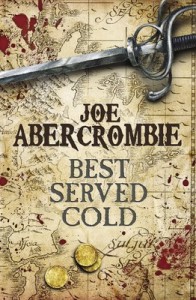 On a more serious (less career threatening) note, Lou Anders, the big shot at Pyr Books (and your North American editor) has called you ‘The Second Coming of Joe Abercrombie’. Now, for a second coming to occur one assumes that the previous Joe Abercrombie is dead and/or no longer exists. Did you off him yourself? How do you think he feels about this?
On a more serious (less career threatening) note, Lou Anders, the big shot at Pyr Books (and your North American editor) has called you ‘The Second Coming of Joe Abercrombie’. Now, for a second coming to occur one assumes that the previous Joe Abercrombie is dead and/or no longer exists. Did you off him yourself? How do you think he feels about this?
First of all, let me answer before Joe Abercrombie can. I have never tried to kill him. I have never hit him in anger. I have never physically assaulted him with anything but his best interests in mind. I say this because, if you ever ask him, he will eagerly tell you that I once defiled his person with an errant finger. Don’t believe it. I was acting in self-defense. But, regardless of this, we must consider two things. First, Lou Anders is a man of decency and honesty and he is no liar. Second, Joe Abercrombie is not yet dead. Thus, in addition for my editor to be correct, Joe Abercrombie must die.
I will pay you, Aidan Moher, for this grim and gruesome task. Bring me his head and I shall grant you the youngest of my daughters in marriage. She will bear you many fine sons and your legacy shall continue once Abercrombie’s is ended.
Getting more serious, it’s actually a distinct honor to be compared to such. Joe Abercrombie’s books were something of a reassurance to me when I read them, in that you COULD actually create a violent fantasy world and have people not just believe it, but love it. If I had to confirm the comparison, though, I probably wouldn’t without a “but” at the end. I tend to be a little more upbeat and positive in my writing; it works for me just as negativity and darkness works for him. However, it’s pretty interesting to be given another man’s title, nay, his very IDENTITY, while he’s still alive.
But I’m pretty sure his wife is hot, so I accept it.
I’ll, uhh… pass on that task. Have you seen the size of Joe’s books? One blow to the head from one of those bad boys and I’d be out like a light and Joe no less alive! Thanks, though!
You have a story in the recent The Dragon Book anthology that you co-wrote with Diana Gabaldon. How does a young, as-yet-unpublished author find themselves working with one of the mots successful names in the industry? What was the process like, working with Diana?
We have the same agent. It was quite a fun process. Mrs. Gabaldon has an immense amount of talent and clout and it was quite an honor to work with her for as much as we did.
I imagine very few people can say they’ve written a story with such a major name, much less a story about a weed-smoking zombie. It only makes the experience all the more aromatic.
One of the most immediate and notable characteristics of Tome of the Undergates is that it begins with a two hundred page battle sequence. How the hell does someone even go about plotting and structuring a battle that lasts that long? Any authors or books that you’ve read that helped you in that respect?
This may be a point of contention between me and my readers, but I’m not actually convinced I did write a two hundred page fight scene. The book’s introduction is two hundred pages, yes. It revolves around a central battle, yes. There is at least one dead body per chapter, yes. But when one thinks of “two hundred page fight scenes,” one probably thinks of fighting…for two hundred pages. In reality, it’s more an introduction to a fantasy novel that doesn’t involve a prophecy or court intrigue or a farm boy discovering his destiny, instead involving a woman keeping score of her own personal genocide, a man realizing he’s slowly going insane and another fellow trying his damnedest to kill himself and take everyone with him.
…also, did I mention the crotch-stomping? There is crotch-stomping. A man gets his crotch stomped. To pulp.
But, anyway, there is a lot of violence, and if you’re asking how I managed to achieve that, I’ve always had a personal philosophy when it comes to action: “Ramp that shit up.” Conflict, I feel, has to keep growing to remain interesting. Immediate conflict has to grow immediately. Thus, if you stab the first man with a sword, you have to hack off the next one’s head. After you decapitate that guy, you have to rip the arms off the next one. After you’ve killed three guys, you have to have a giant fish-demon evangelist rise up and strangle someone.
As for influences, I’ve already mentioned Mr. Abercrombie and feel quite unclean for doing so, so I’ll go ahead and either confirm peoples’ worst suspicions about me: I draw a lot of inspiration from video games like God of War. Violence in fantasy is very, VERY frequently two guys standing still hitting each other. To capture someone’s attention, it needs to be cinematic, aptly described as the situation warrants: with swift and nonchalant brutality, with long and slow agony, in the viewpoint of the haggard protagonist breathing heavily as he sprints over corpses to get to his next target, in the viewpoint of the terrified citizen trying to escape while blood is raining around him. Simply put, the only wrong way to do combat is to do it without caring.
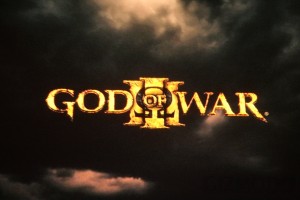
Videogames are something you and I have spoken about a few times and, judging from your blog, are a big key to keeping you entertained. Besides drooling in anticipation for God of War III, what’s been keeping you busy on that front these days?
2010 is turning out a little depressing for video games, actually. It’s a shame, since the games coming out actually aren’t that bad, but are having trouble following the heavy-hitters that came out toward the end of 2009: Assassin’s Creed 2, Uncharted 2, Dragon Age: Origins and the incomparably good Batman: Arkham Asylum.
I’m currently embroiled with Darksiders, and it’s a severe “but” game (“the gameplay is good, but the characters are silly,” “the conflict is fun, but the overarching story is lacking,” “it’s good, but it ain’t Zelda good”), which I think will be the tone for every game until March, which is when our man Kratos comes out alongside the new Final Fantasy XIII game. The sole exception might be the upcoming Mass Effect 2 game, but I have my doubts.
I am, however, looking forward to Dante’s Inferno with an immense deal of shame. Ideally, as an author, I should be railing against anything with a plot so stupid (ripped, shirtless crusader travels to hell, fights unbaptized babies and diarrhea monsters) even pretending to share something with the Divine Comedy. As an author who writes about demons, though, I’m utterly enchanted by their vision of hell as being a world of twisted reflections of ourselves and personifications of our own worst sins, complete with torture factories, lakes of boiling blood and suicide woods. The fact that it is basically a God of War reskin is of some concern, though.
Still, I could go on at length on the whole concept of “visions of Hell,” but then we wouldn’t get anywhere.
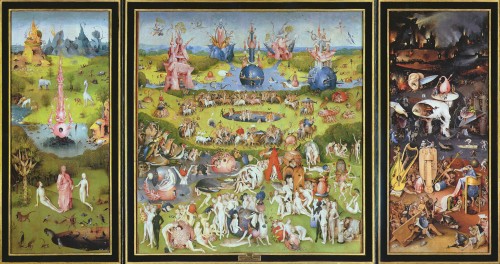
No, no, please do! Just keep it (reasonably) short!
As near as I can tell, there are two guiding philosophies behind the nature of Hell. The first is that which relates to the more biblical definition of Hell: it is a place that was made for us, for mankind, and is thus a twisted reflection of our sins and the worst parts of ourselves. This is where the uncanny valley starts to play in and you see the real creepy stuff that you see in Renaissance paintings and “The Garden of Earthly Delights” by Bosch (ed. – One of my favourite paintings!). This is sort of a more pervasive fear, a sort of virulent terror that comes from staring at ourselves in the mirror as we frown and seeing ourselves smile back at us.
The other definition is that Hell, while still bearing goals very much detrimental to mankind, has always been there and is not so much made for us as exists alongside us, akin to another dimension. In this vision, Hell is more organized and its inhabitants are typically more akin to an army or consuming force, usually out to threaten mankind. You see this most often reflected in books (demons out to come back and take over the world) and also games like Warcraft, Warhammer and Darksiders.
Of the two, I kind of dislike both. I’m intrigued by the idea of Hell having always been there, but I really don’t get the same sort of deep-down-creeps from the latter vision that I do from the former. I mean, sure, total destruction of mankind is scary, but what happens after that? At least in Bosch’s vision, you get fucking eaten by a bird wearing a crown afterward while he fingers your butt.
As far as these both pertain to stories, though? Whichever fits the need, baby.
On a similar note, as a writer who also dives into that medium, what sort of narrative techniques do you think writers can learn from Videogames, if any at all? And what about the other way around?
Lately, there’s been a lot of the reverse: video games learning from authors (what with Richard Morgan being offered the potential to write video games for…EA, I think?) (ed. – Yep.) and the medium is much better for it. The phrase “it’s a video game” is no longer a valid excuse for having a terrible character, for example.
But a lot of what video games have is style, which I think is something that fantasy novels is somewhat lacking in some cases. The term “worldbuilding” comes readily to mind. Think about the last time you heard it used as a merit of a book you’ve read. Now think back to that book. I’m going to make a risky gamble and say that the “worldbuilding” compliment was used either in reference to the book’s political system, courtly intrigue or magic system.
Now, was everything else a replication of medieval England, right down to the “m’lords?”
Now, think to the last time you saw something truly alien? Something like China Mieville’s cities and societies, or R. Scott Bakker’s cultures; both amazingly talented authors, but out of how many “m’lords?” How often do you get to read a book and be really interested by the world? Not the politics or the magic, but the fact that this tree bears fruit that has grown legs as a natural defense mechanism, or that this race eats flesh on this day because of this reason?
Now look at games like Psychonauts or God of War or Warhammer (granted, those last two actually are based off ancient societies, but still), and think back to what made them great. No matter how original your premise or how courtly the intrigue, there’s still a certain pleasure in watching a dude fight a rampaging Cyclops through a primeval forest that is actually the crown of a titan climbing the mountain of the Gods.
Cinema, of course, is no substitute for substance, and even the most imaginative piece of landscape isn’t worth crap if the story is shit (unless you’re a Na’vi, apparently), but there’s no underestimating the ability to see something new and truly wild and then just jumping right the hell on in.
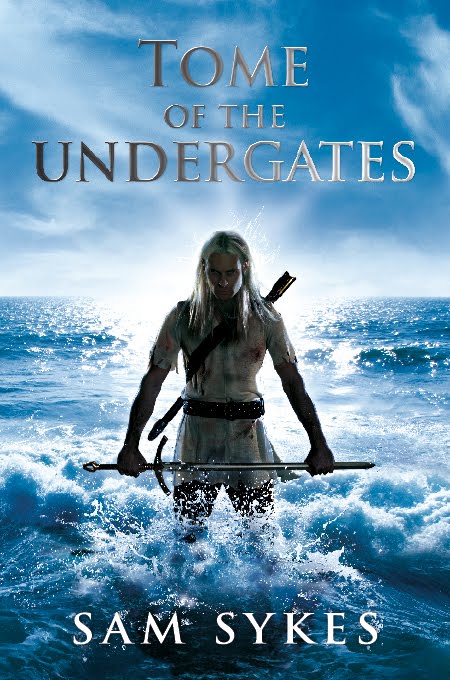
Tell me about the cover art and why Geralt the Witcher is going for a dip in a seething ocean.
Let me begin by saying I very, VERY eagerly await the cover art for THROUGH BENDED GRASS.
Second, having played the Witcher and having read my own book, I can safely say that there are at least three great differences between Geralt and Lenk (the fellow on the cover). First of all, Geralt is an albino. Secondly, Lenk is shorter and more wiry. Third, Geralt is an amorous, talented mutant assassin and Lenk is a short, schizophrenic misanthrope and IT’S A GODDAMN COVER AND I LIKE IT AND I’LL KILL YOU IF YOU SAY ANYTHING ELSE ABOUT IT ARGH ARGH ARGH.
Of the many, many lessons I am learning about publishing is that cover art is probably the most hotly contested piece of debate in the whole goddamn lot. You cannot please everyone. Sometimes, you can’t even please anyone. But it’s really all about recognition. It’s easier to hear TOME OF THE UNDERGATES and think “oh, the cover with the angry-looking dude” than it is to hear KRAKEN and think “oh, the one with tentacle rape.” (Apologies, China Mieville. Eagerly looking forward to it. If there is rape in it, I hope it’s not with tentacles.)
As for the ocean…think less about the guy standing in it and more as to what is lurking beneath it.
Very cool. Any word on the North American cover art?
I feel I should check with Lou Anders about this, since he’s been routinely going out of his immense mind with worry over this very subject. In fact, he’s threatened to go on a shooting rampage in his office three times about it. As the new guy at Pyr, I’m tasked with talking him down. It’s actually not that hard, since he does work from home and that’s where all his stuff is.
When I last heard, we were probably sticking the UK cover art. I’m not sure how to feel about that, really. On the one hand, I do like the UK cover art, no matter what you may say, Moher; I nearly crapped myself when I saw the water. But Pyr’s recently been seeing a lot of success pimping out fantasy artist Jon Sullivan. I really like his work, too, ever since seeing the cover work he did for Adrian Tchaikovsky’s SHADOWS OF THE APT series.
In the end, even though this might give Lou further stress on the subject, I’m massively happy with either plan. It’s always cool to see your work put down into art. My very good, very old friend Ashley Cruikshank has actually graciously done some for me and I’m very eager to put it up on my site when it’s finished.
I suppose there’s not an author on Earth who wouldn’t love to see more variations of art based on the world and characters they’ve created. You’re lucky, being with two publishers (Gollancz in the UK, Pyr in the US) who I consider to be at the top of the heap with regards to cover art. Seeing the cover for your first novel must have been quite a thrill. When was the first time that this seemed real, that it wasn’t just a dream? Or has that even happened yet?
How is that dream actually supposed to go, anyway? When you lay eyes on the cover art and realize you’ve just created a work that will live (hopefully) long past your life, are you supposed to be overcome and spontaneously wet yourself? Or is it one of those situations where you suddenly gain the power to heal the sick and cure your own impotency?
…not…not that that’s a problem for me.
At any rate, I’m not sure I’ve had this happen yet. When I first laid eyes on the cover art, I thought: “Why does he look like David Schwimmer?” When I laid eyes on the revised cover art, I thought: “Is he wearing pants?” When I voiced this to my editor, Simon Spanton, he quickly had a third cover whipped up in which a splash covers the affected area and it’s less of an issue (though if you look really hard, you can probably experience some doubt).
Likewise, when I got my ARC, I thought that this thing was big enough to be able to bludgeon a wild boar to death and I hadn’t actually expected that (I was aiming for something like a beaver or an otter).
If it does happen, I expect it will be when I have people saying they like (or hate) my book. Until then, I live in perpetual fear of resting on my laurels. The current big issue is great authors who are consistently late with their stuff. I’ve seen some of the vitriol leveled at George R.R. Martin and it’s baffling. I don’t ever want that to happen to me, largely because I don’t think I’ll be able to conduct myself with half as much dignity as he does.
You’re a young buck, about the same age as me (just turned 26). What’s the story behind getting published so young? A task that takes most folk a lot longer.
Well, happy birthday! I’m still 25, though, so you’ll have to remind me of what life was like before people knew they could eat eggs.
But I digress…
An agent is a good help. A very good agent is an immense help. If your agent happens to be a very, VERY good agent like my own Danny Baror, it’s probably one of the best things you can do for your career.
However, no matter how good your agent, you can’t sell an awful book. Given the state of the economy, in fact, you probably can’t even sell a pretty good book. Publishers, as I’ve found, are getting quite picky about what they choose and they are exceedingly wary of choosing unproven talent.
But, as I’ve heard so many times before, getting publishes is composed of 5% talent, 5% luck, 90% persistence. I won’t lie to tell you and tell you that I just got lucky with TOME, it’s quite a good book and I think a lot of people will enjoy it. Clearly, my editors thought so. But a lot of it was luck (just not “just” luck), a lot of it was talent and a lot of it was persistence.
Really, there’s no easy answer as to why anyone gets published or not published. Sometimes, it’s as easy as “right place, right time” (‘sup, Dan Brown), sometimes it’s as simple as “wrong place, wrong time.” I’d say, though, that if you’re even getting an editor to the point where he is telling you it’s the wrong time or the wrong place (unless you’ve sent your fantasy novel to a romance publisher), you’re in a pretty good position to move forward. And that’s where the 90% comes in…
Wait… I can eat eggs? That’d go damn well with my morning prune juice and shank of sabre-tooth tiger. I’ll have to look into that.

Getting published is on the first step towards becoming a self-sustaining, successful writer. As a new author, how do you plan on carving out a (hopefully) lasting niche for yourself in the industry?
I’m not really sure I have a plan…hell, I’m not sure anyone who writes a book goes into it with a plan beyond: “These are the characters, here’s some stuff that happens to them. How can I make that sound sexy?”
Well, I take that back, one of the big questions authors are asked frequently (or so I’m told) is: “Do you write for a certain demographic?” The answer is sometimes easy, sometimes not. Obviously, a YA author is not writing for Shakespearean honors scholars. But is a YA author writing for, say, amputee cheerleaders with cocaine addictions and salmonella poisoning? Probably not.
I’m sure there’s some authors that go in thinking “this is my book, it will appeal to this crowd, to that end, I will touch on these bases and it will be a success,” but you rarely hear of them. A lot of the times, a book’s popularity is purely accidental. All you can really hope to do is write something good and hope it goes somewhere.
That’s pretty much all I did. If it doesn’t work, there is an ancient tradition that dictates you can take another author’s series by defeating them in hand-to-hand combat. Patrick Rothfuss knows this well; his book is late because he has been challenged to duels to the death every day for the past three years.
Back to Tome of the Undergates, it is, like so many other traditional Fantasy novels, the first in a series. Why go that route, instead of trying to break into the industry with a stand-alone and work on your opus later in your career. And don’t fall back on the cliche: ‘The story I wanted to tell just wouldn’t fit in one book!’
TOME actually started as one immense book (of course, now it looks like it will be three massive books). To use the cliché is slightly accurate, but a lot of it comes down to the ease and comfort of the reader. I am here as a gentle, nurturing influence, to slowly ease the book in your hands, tuck you in at night, kiss your forehead and say: “It’s okay, my little gosling, there’ll be time to read it all.”
As creepy as that image is, the image of me bursting through your door, dropping a dictionary into your lap and screaming: “Read it. READ IT NOW” is far worse.
This isn’t to say that readers can’t handle such a massive load (tee hee), so much as it is to say I’d rather not force it on them (oh, lordy). I mean, there are certain people out there who look at something so thick and massive (okay, that was the last one, I swear) and promptly weep in utter joy, but when was the last time you saw the biggest book in the fantasy section and didn’t say: “Holy crap, that looks like a chore.”
So, yeah, part of it is that there was just too much story, but a lot of that was done so it’s easier for readers to accept. The other part of it is (as you well know, being a writer yourself) books grow, they take on turns you don’t expect and suddenly the nice, tidy outline you wrote just doesn’t make sense anymore, no matter how much you’d like them to.
So, think less of the image of a dainty author sipping tea and giggling: “The story I wanted to tell just wouldn’t fit in one book!” The far more accurate image is of an author with a torch and a shotgun, madly hacking at a hydra-esque abomination of word counts that keep growing, deadlines that keep looming and paper that keeps getting bigger and bigger, all the while screaming: “WHY WON’T YOU DIE?!”
When you began querying for Tome of the Undergates was there any hesitation from publishing houses or agencies at the hefty word count?
As I said earlier, publishers are hesitant about everything these days. My agent handles most of those particular issues (preserving my fragile, tender ego is another thing he’s very good at), and though he routinely threatens to show me the rejection slips, I did get to see one of them.
There was less hesitation about the actual length and more hesitation about the actual length of content, if that makes sense. They felt there was a lot more in-fighting between the characters than could be expected of reasonable people (the idea here being that people who are typically the central figures in a fantasy book would not, by any means, be reasonable).
But, what can you do, really? If they don’t like the book, they don’t like the book. I can’t make them like the book and I can’t make the book like them. Don’t get me wrong, there are certainly parts of a book that can, and should, be trimmed or sculpted to resemble something more pleasing to the eye. But those come after you’ve got a publisher that likes the book as it is (but thinks it might look prettier). If a publisher just comes out and says they don’t like the book, there’s no particular need to bust your butt trying to please them.
Speaking of ego, the first reviews of Tome of the Undergates are beginning to appear online. Some authors avoid ’em like the plague, others (*coughjoeabercrombiecough*) follow them devilishly and put the reviewers in their place with supreme snark. How does Sam Sykes handle reviews?
Of all the things I had managed to prepare myself for, bad reviews was not one of them. Interestingly enough, I had a conversation with Mr. Abercrombie about this same subject that proved exceedingly helpful for me. His best advice to me was that it gets easier, but it never really gets easy.
This is sort of a problem for authors nowadays with the advent of the internet. It is, in my opinion, exceedingly hard to be a new writer and not have an online presence. At the very least, you’re doing yourself no great favors by being one of those rare, reclusive authors. When you’re someone with an immense following already, you can do that. When no one gives a shit who you are to begin with, they sure as hell aren’t going to go sniffing you out.
Thus, reviews can be really rough to ignore; they get into your head, they can spoil your mood for the whole day and you’re convinced that your career ends if just one person doesn’t like the book. But, as Messier Abercrombie also says, you don’t do yourself any favors by being meek. So it also serves you well to track down what people say about you (in a positive way) and trumpet it from the rooftops, cram it down peoples’ throats and blog the hell out of it.
So far, I try not to let reviews get me down (which does get easier, as said), but I haven’t had any real bad reviews so far. I mean, the harshest one I’ve received was from The Wertzone and even he said he wanted to know what happened next. And, from what I can tell by his reviews, he and I have very differing tastes on what we find entertaining, so I count myself lucky in that he not only wanted to see more, but all other reviewers so far have shared that sentiment.
What can we expect of the sequels to Tome of the Undergates?
Long-jawed women, wizard-hunting librarians, holy crusades as carried out by sadistic lizardmen, green-skinned, seven-foot-tall long-eared stranglers and their personal philosophy behind genocide, spectral grandfathers, schizophrenia, remorseful demons, militant affairs, flaming urine, alcoholism, ghosts, mutilation, a central villain that is a philosophical hybrid of David Bowie, Charles Darwin and a flamethrower, and eel tits, eel tits, eel tits.
Flaming urine?
A lot of fantasy seems to deal with the concept of magic in a very convenient manner. If we are to accept the concept that people who are able to use magic do so as a result of their being something special within them, it seems perfectly logical to me that said genetic exception would be difficult to keep from affecting the rest of their physiology.
I mean, if you can shoot lightning from your fingers, why wouldn’t you pee fire? If you can turn your hands into snakes, why wouldn’t that also sometimes inadvertently alter other, less couth subjects of your anatomy?
It’s perfectly reasonable…I mean, as far as magic goes.
Uhh… anyway. Before we wrap this up, throw a few authors or novels at me that you consider to be criminally under-read.
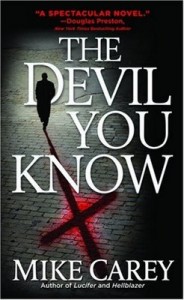 Boy, I’m not sure I know of any authors I read that are criminally under-read. Does that make me a trend whore? I do know of one that’s my favorite that I don’t hear nearly enough of, though, and that’s Mike Carey.
Boy, I’m not sure I know of any authors I read that are criminally under-read. Does that make me a trend whore? I do know of one that’s my favorite that I don’t hear nearly enough of, though, and that’s Mike Carey.
Mike Carey writes the Felix Castor novels (that begin with THE DEVIL YOU KNOW) about the titular character, an exorcist in London at a sort of spiritual turn of the century when the dead begin returning to the mortal world at the head of a demonic incursion. To me, Mike Carey defines Urban Fantasy: gritty and gray without being in your face about it, tough and uncompromising without trying to show how badass he is, and not a werewolf-vampire-human threesome to be found.
What I most like about his work is that he can actually do “morally gray” characters in a way that doesn’t translate to “everyone is a shithead.” I just wish Felix could catch a break once in awhile. It’s quite depressing.
Sam, I’d like you to step away from the keyboard for a moment and ask any one of the characters from Tome of the Undergates to introduce themselves and then answer the next question.
Why should we buy Tome of the Undergates when it hits shelves?
Ah, you’d want to talk to Gariath about that. One second…
“Humans continue to delude themselves with illusions of intellectualism through books, as though running your fingers through your asscracks and hurling the ensuing feces against paper proves anything more than your race’s stupidity and natural affinity for all things reeking. To that end, I would say that no book you read will make you any less of a waste of flesh and breath. And if I had no stake in it, I would say that. As it is, I do, so I do say you will read this book. If you do not, I will indulge your proclivities toward filthy places and shove whatever other tripe you choose to poke your little pink snout in far, far up your rectum. Very damp in there. Very dark. Good luck reading it, then.”
Goodness, how rude. Threats from a violently unstable person…or brand new way of absorbing the written word in a manner not unlike a suppository? You decide, gentle reader, you decide.
By the way, that bit about Videogames? It was a trick question. I know both Lou and Simon (Sykes’ editors on either side of the pond) read A Dribble of Ink. So, the correct answer was: Oh, I don’t have time for videogames since becoming a newly published authors! This chain I’ve crafted for myself locks me to my desk, not allowing me within 15 feet of my Xbox.
Fail.
I actually don’t expect scorn from either of them, really. Simon and Lou are two of the hardest-working people I’ve ever met. Thus far, they have been taking the news that book two (BLACK HALO) will be bigger than TOME with serenity…almost sinisterly so. Either way, they’re both very accommodating to all aspects of me and my need to express my homicidal tendencies through the electronic medium. I mean, it’s either that or risk losing a mailroom worker to one of my flights of horrific fancy. It’s not like they’re going to move bodies for me, at any rate.
Simon was very clear that Horatio was the last one.
 Well, your nose is sufficiently brown now. I suppose that’ll do. Well, Sam, any last words?
Well, your nose is sufficiently brown now. I suppose that’ll do. Well, Sam, any last words?
To you, Aidan “Mo’ Hair” Moher, thanks for giving me the opportunity to spill my intellectual innards on your wonderful blog in a form of ritualistic interview seppuku I call “interppuku.”
To you, future readers, thank you for reading this interview and for reading TOME OF THE UNDERGATES in the future. I guarantee you will find it to be an ass-packed adventure filled with plot aplenty and a rather unsettling underlying thought process. Those finding their fantasy lacking in stabbings, shootings, insults, intrigue, secrets, lies, schizophrenia, religious queries and crotch-stomping will be quite pleased with this book.
And if you don’t like it…I will find you. And I will make milk’s meat out of you.
Funny story:
Once, a homeless Irish guy made fun of me for having the same name as a sheep (Mohair Sweaters and all that…). I suppose he was too drunk to remember his country’s famous landmark, The Cliffs of Moher. My girlfriend got a kick out of that….
In any case, thanks for dropping by A Dribble of Ink and best of luck with Tome of the Undergates!
Thanks a heap, Aidan. I look forward to the mental scarring this interview will provide our valued readers.

@adribbleofink That was a fantastic interview, Aidan. Now planning to buy when it hits the US.
@BrokenFiction Thanks! You can blame @samsykesswears for the success of the interview! Glad I could turn you on to the book.
@adribbleofink I feel like I should hand over my lunch money to @samsykesswears as well.
@BrokenFiction I think he’ll be happy enough if you buy his book!
@adribbleofink Loved this one, Aidan. Great read, really insightful. Got my first interview all lined up now and I’m taking lessons.
@adribbleofink Also now I need to get my grubby blogger’s paws on Sam Sykes’ debut. Just about the best recommendation there can be, right?
@niallalot Who’re you interviewing? I’ve no doubt that you’ll bring quality to the table.
@adribbleofink Why, none other than the sleeping dragon @MarkCN himself. It’s a ways off yet though, closer to City of Ruin than now.
@niallalot Ahh, be careful or Mark’ll talk circles around you and you won’t know what happened! I know from experience… ;)
@adribbleofink Kind of looking forward to that, actually. Rereading Nights as soon as I have the time so that I don’t seem a complete twit.
@adribbleofink Any pointers I should bear in mind? You certainly did an admirable job of keeping Sykes in line.
@niallalot I do my interviews in several small chunks. It lets me get a feel for the interviewee and helps me mould the conversation.
@adribbleofink That’s the plan, such as I can be said to have a plan beyond taking him to task over giving up on the new weird so easily.
Great interview! Very fun to read.
“There’s no underestimating the ability to see something new and truly wild and then just jumping right the hell on in.”
“‘These are the characters, here’s some stuff that happens to them. How can I make that sound sexy?'”
Writerly quotes! May I have your permission to stick ’em on my forehead? I’m hoping they’ll help any writer’s block I might be suffering from…
great interview, peeing fire sounds umm unpleasant but hilarous if it’s happening to someone else.
Mike Carey’s Felix Castor novels are amazing.
[…] on 15 April 2010 in the UK). Sam has already conducted an interview with Aidan Moher, over at A Dribble of Ink where they discussed… well, video games and cover art and other such boy things. After […]
[…] http://aidanmoher.com/blog/2010/01/interviews/interview-sam-sykes-author-of-tome-of-the-undergates/ Posted by Blue Tyson 4.5, study, t non-fiction, z free sf Subscribe to RSS feed […]
[…] Sam’s a good friend of this blog (seriously, he’s behind one of my favourite interviews I’ve conducted), but I can’t give him (or, more accurately, his publisher, Gollancz) a free pass here. […]